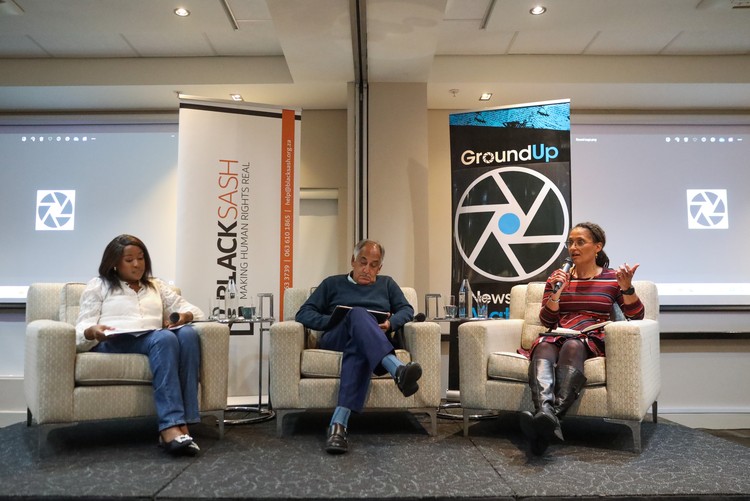Can South Africa afford a Basic Income Grant? Or can we afford not to?
GroundUp and Black Sash hosted a debate on the feasibility of the Basic Income Grant (BIG) on Thursday
Rachel Bukasa of The Black Sash chaired a debate on the Basic Income Grant between Cas Coovadia of Business Unity South Africa and Thokozile Madonko of Wits University. Photo: Ashraf Hendricks
- GroundUp and Black Sash hosted a debate on the feasibility of the Basic Income Grant (BIG) in Cape Town on Thursday.
- Business Unity South Africa CEO Cas Coovadia, who argued against, says there is not enough money in South Africa’s ‘bank account’ to fund a BIG.
- Wits University researcher Thokozile Madonko arguing for the Basic Income Grant said that BIG was ultimately about political will.
Something must be done to solve South Africa’s social ills but the country cannot afford nor sustain a Basic Income Grant (BIG). This was the position of Business Unity South Africa’s CEO, Cas Coovadia, during GroundUp and Black Sash’s BIG Debate in Cape Town on Thursday.
The proposed Basic Income Grant (BIG) would be a cash transfer from the government to citizens aged 18 to 59. The South African government has expressed support for this, and has indicated that the existing R370 Social Relief of Distress (SRD) grant that was introduced during Covid, could be the start of a more comprehensive, universal basic income grant.
In his Budget Policy Statement in Parliament, Minister of Finance Enoch Godongwana announced that the monthly SRD grant would be extended to March 2025 “while government considers social security policy reforms and a funding model”.
He had said that if the temporary grant “or a similar type of grant” were to be made permanent, the number of social grant beneficiaries would rise from 27.3-million in 2023/4 to 40.4-million in 2040/1. This would cost 3.8% of South Africa’s gross domestic product, and would require a permanent source of funding such as an increase in taxes.
The National Treasury has strongly opposed the basic grant, arguing that it is unaffordable in South Africa’s current fiscal context of high debt repayments and low economic growth.
Arguing for the BIG on Thursday was Thokozile Madonko, a researcher at Wits University. She said, “10% of the population owns more than 80% of the country’s wealth.” She said the grant was one way to start redistributing this wealth.
Research shows that a basic income grant would have a multiplier effect in the economy. Putting cash in the hands of more people would result in more growth in the local economy than the cost implications of implementing a BIG, Madonko argued.
Coovadia said he has no doubt that there is such research, but maintained that there is not enough money in South Africa’s ‘bank account’ to fund a BIG.
He conceded that more comprehensive social grants may be necessary to protect the most vulnerable in the country “in the interim”, but said that it is not sustainable to have citizens dependent on cash transfers rather than income from jobs.
He said the business sector needs to play its part in ensuring that “the dividends of democracy are seen by many, and not just a few,” but those dividends, he said, should be in the form of jobs, wages, and good government services; not in the form of cash.
Madonko argued that the BIG is a question of realising people’s constitutional rights. Half the population is unemployed and one in four children in the country are stunted and going hungry, said Madonko. “We don’t have a choice. When crisis hits, people lose cash. We need to be able to provide cash fast,” she said.
During questions from the audience, Deputy Director-General of the national Department of Social Development, Brenda Sibeko, stated that it is no secret that her department is pro-BIG.
“When you have 11 million people without purchasing power, how are you going to grow the economy?” she asked. “The higher the [social] ills, the higher the crime. That I expect is a constraint on business.”
Sibeko asked Coovadia what amount of spending on social grants would be deemed “affordable” for the business sector.
Coovadia, in response, answered that the business sector should have a meeting with civil society and government to work it out. Black Sash National Director, Rachel Bukasa, who was chairing the debate, interrupted him and said: “We’ve been trying to get business to the table”.
“Call me after this event,” Coovadia said.
Letters
Dear Editor
I'm encouraged by Department of Social Development; Cas of BUSA and the lady of IEJ. Let's have a workshop and determine "how much is enough". This should be the slogan. Otherwise we'll be shouting from our corners with researches that "confirm" our vision/mission.
The bulls are fighting and the grass suffers. The stakes are far too high.
© 2024 GroundUp. This article is licensed under a Creative Commons Attribution-NoDerivatives 4.0 International License.
You may republish this article, so long as you credit the authors and GroundUp, and do not change the text. Please include a link back to the original article.
We put an invisible pixel in the article so that we can count traffic to republishers. All analytics tools are solely on our servers. We do not give our logs to any third party. Logs are deleted after two weeks. We do not use any IP address identifying information except to count regional traffic. We are solely interested in counting hits, not tracking users. If you republish, please do not delete the invisible pixel.



